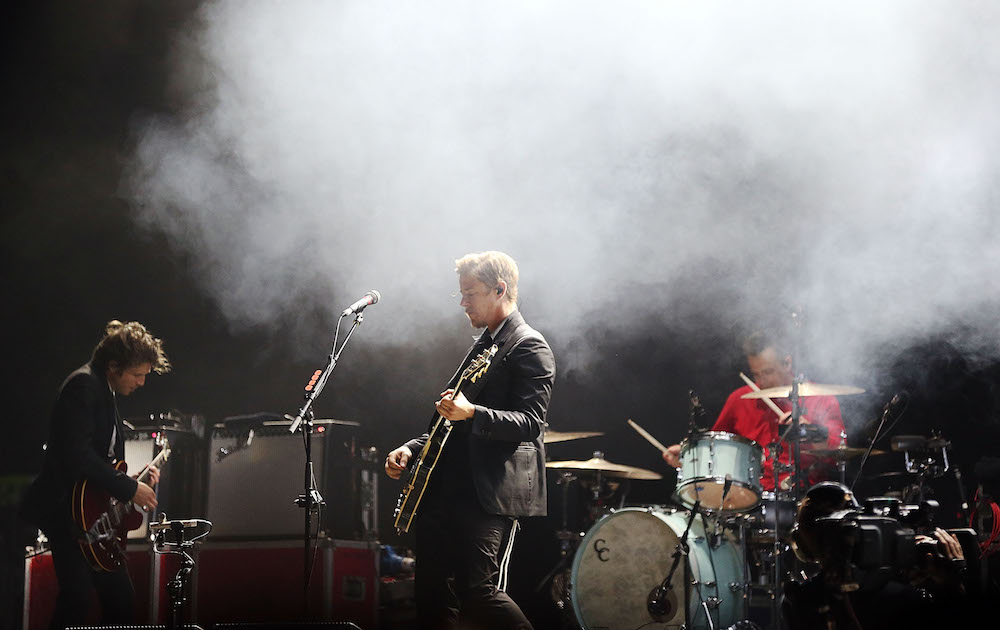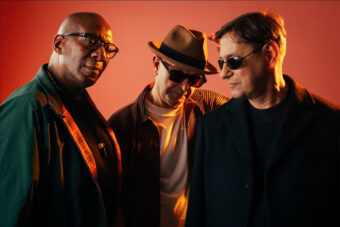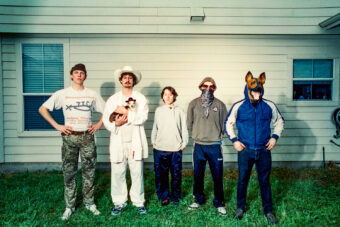Interpol guitarist Daniel Kessler is not the most exotic creature haunting Washington Square Park on this sweltering August afternoon. That would be the guy in the astronaut suit, floating through the typical crowds of NYU kids as if they were asteroids. But on a day like today, in his dapper all-black blazer and dress shirt ensemble, Kessler comes close. Thinking he must be overheating, I offer my condolences, but the 43-year-old is without a drop of sweat. “This is nothing for me,” he says with a gentlemanly smirk.
This is all very on-brand for Kessler. When Interpol’s beloved debut album Turn on the Bright Lights broke through in 2002, they were as known for their suits as they were for their pulsing reverb-heavy post-punk songs. The group, which formed when its members were themselves NYU students in the late ‘90s, has recently been split between past and present. They spent much of 2017 touring behind the 15th anniversary of Bright Lights, and much of the rest of the year recording their sixth album Marauder, released last week.
In a significantly less on-brand moment, Kessler admits he was anxious about the former. “I found myself on stage and thinking, ‘You’re a little nervous up here right now,’” he says. “It’s complicated because you don’t know what people really want.”
Turn on the Bright Lights still sits at the center of Interpol’s legacy, a classic that is nonetheless the most divisive album of New York’s aughties rock revival. It’s been acclaimed for its sense of tense isolation, placing it unmistakably in post-9/11 NYC, just as it’s been derided for supposedly taking too much inspiration from ‘70s and ‘80s forebears. From the vantage of 2018, with Post Malone the biggest rock star in the world, the amount of cultural hand-wringing once inspired by a fairly straightforward indie album like Bright Lights seems quaint.
But Interpol soldier on. After founding bassist Carlos Dengler quit during the sessions for 2010’s limp Interpol, frontman Paul Banks picked up the bass and the band recaptured some of their moxie on 2014’s El Pintor. Marauder is similarly assured. “Rock’n’roll, bitch / I’m into it,” Banks shouts on one song, as if the last 15 years of rock’s declining cultural influence never happened. (He has said that he’s singing the album in the voices of characters who represent various facets of his personality, including some from Interpol’s debauched early days.)
Marauder brings back together three 40-somethings who are no longer attached to any particular scene, and very much into their own separate things. In Washington Square Park, Kessler eagerly pulls up Spotify on his phone to show me the music of Emahoy Tsegué-Maryam Guèbrou, a piano-playing Ethiopian nun. A week later, I speak with Banks on the phone, and he tells me he’s pretty into Metro Boomin lately. And though though drummer Sam Fogarino isn’t available for an interview, Kessler assures me he’s doing well, living in Athens, Georgia, and studying classic soul records. This is Interpol in 2018. Read Spin’s interview below.
Daniel mentioned he was a little nervous before the Turn on the Bright Lights anniversary show at Forest Hills. Paul, was it the same way for you?
Paul Banks: No. I think if we weren’t already deep into recording and writing new music, then I might’ve felt like, “What are we doing?” But I felt that because we were one foot in the future, it felt like, “OK, let’s lean back and just go interact with our fans and celebrate our first record and have fun.” I felt comfortable because we were taking breaks while writing the new record and I wasn’t worried that we were losing the sense of where we were going with the new music.
Did a sense of nostalgia ever creep into making Marauder? A lot of folks from the aughts New York scene came back last year: Grizzly Bear, LCD Soundsystem, Yeah Yeah Yeahs.
Banks: It was just cool for us to have sort of a refresher for what our original DNA looks like, but I also really believe that I never got to a point where I was running out of new inspiration and new ideas. So I’d like to believe—you have to, to survive—that I’m getting better. I look fondly on what I was writing back then. On the guitar front, I kinda would play that stuff and be like, “Yeah, this song is really great, but I like how I play guitar now.” It wasn’t like, “Oh shit, I gotta circle back.”
Daniel Kessler: We don’t think back, like, “Oh, the New York of yesteryear.” At the same time, there is a bit of romanticism thrown toward New York in the early 2000s. In hindsight, I guess it was an exciting time. But I haven’t felt too much of the separation, of it being a time that’s over. Obviously, New York has changed a great deal, like the Lower East Side. As a kid, I was really nostalgic, but as an adult, I’m really not, and it feels good.
I feel very fortunate. I never even had any plans to make a first record, and everything else after that is incredible—the fact that we can go on a Bright Lights tour and see kids. Like, “Dude you probably weren’t even born, or were super [young] when it came out.” That feels rare in this sort of ADD age, where people are pulled in different ways, desensitized. It’s not even music competing against music, it’s music competing against all the other things available to us in a heartbeat.
There was a Spin interview from 2007 where one of you said if a bandmate quit, Interpol couldn’t exist anymore. When Carlos D left the band was there a period where it was like, ‘Oh shit, what do we do?’
Kessler: He left after recording all his bass parts and keyboard parts for the fourth [self-titled] record, when we hadn’t mixed the record yet. Paul and I had to go to London to mix the record. We put all this work into it, of course we’re going to keep it. We knew we owed it to ourselves. “Let’s just see. We’ve gone this far.” I didn’t know how it was going to work. I didn’t count on anything.
El Pintor was the first record we made as a trio. We made that record without a plan, really. We didn’t know Paul was going to play bass. It just sort of came up in the moment and we needed to move forward. One day, he was like, “Why don’t I bring a bass tomorrow, give some anchor to the songs?” With Marauder, we knew Paul was going to start on bass because we felt really proud of El Pintor. He came right back and wrote “If You Really Love Nothing” and “The Rover” in the first few days.
Paul, did you feel any pressure to improve as bassist for this album?
Banks: Not pressure—as long as we’re evolving in the room while we’re writing, then that’s good. The guys seem happy and I’m having fun. I think Sam and I are getting better. But you just kinda know if it works and if it doesn’t work—you know that from yourself and what your bandmates are reflecting back at you. I feel like, despite their best intentions, they wouldn’t have been able to humor me through two records. We’re all feeling it, so it doesn’t really feel like pressure.
What do you take for inspiration nowadays when you record?
Kessler: The thing I know I need for stimulation and inspiration doesn’t necessarily come in a direct form like music. I go to see films all the time. There’s nothing more New York than going to mid-afternoon films by myself. I go to galleries, I go to museums, I travel a lot.
Banks: I don’t think it’s a process of, “Now I’m making a record, so I’m only listening to this type of thing.” I’m just always doing what I’m doing. While I was recording, I was going through a big 21 Savage and Metro Boomin thing. Also the Migos record [Culture II] had just come out, and I was really floored by that because how big it was—24 tracks. It was one of those albums I was really digesting in full and stoked to realize tracks 22 and 23 [“Made Men” and “Top Down on da Nawf”] were my favorites. It wasn’t that they had a bunch of filler on there. It was like, “Holy shit, this record’s really strong all the way through.” I was listening to Drake, which is sort of habitual.
Now I’m interested in what a Metro Boomin-produced Interpol record would sound like.
Banks: It’d be cool for a remix. He’s dope. There are a couple of days that feel like there’s some intersection between that indie rock aesthetic and hip-hop. On the track “X,” there’s a flute part that just feels like a little bit of an indie rock riff. ASAP Rocky’s record, too. There’s more of an overlap and influence than ever between indie rock and, say, ASAP Rocky, Frank Ocean, Metro Boomin.
Have you had to ask existential questions about what is Interpol in 2018? Because as you’ve alluded to, hip-hop is at center stage.
Banks: To me, it’s no problem. I’ve been talking about hip-hop since 2002. Whether or not for me it was the emergent genre, it was always a fascinating genre I’ve been gravitating toward my whole life. So I feel very comfortable with loads of hip-hop on mainstream radio. To me, it all sounds pretty fucking good. The rock music that I’ve liked typically hasn’t been commercial major rock. It has always been left-center. I feel like there’s always been a place for that, and I can still feel rock music’s influence in other genres. It doesn’t feel to me like, “Shit, I should go back to the drawing board and working on Ableton.” I have, but not because I feel like I’m on the wrong boat. You don’t do what you do because it’s going to be the most popular thing, you do what you do because it’s what you’re compelled to do.
Have you ever read the criticism regarding your lyrics in the past?
Banks: I’ve been annoyed when people have misquoted lyrics and said that they’re shitty. I remember someone fucked up the lyrics to a song I did called, “Young Again,” and there was this other one called “Take You On a Cruise.” They misquoted me and they said, “Time is like a broken watch,” and it’s, “I’m timeless like a broken watch.” For me, one of those lyrics is cool and the other one fucking blows. If you’re gonna quote the one that blows and say that I wrote it, when I didn’t—that blows but I didn’t write that lyric. If you think the one that I wrote blows, that’s actually fine by me—just get the quote right.
I like some of my lyrics more than some of my other lyrics. If it falls into the category of lyrics that I like and you don’t like it, I don’t care at all. If someone were to point out a lyric that I think is kind of not my best, then I might kind of be like, “Oh shit, they got me there.” To be honest, I haven’t read any of the criticism in years. But in my experience, if I like the lyrics, I don’t give a shit what anyone thinks about it.
The 200 couches from “PDA”—could you explain that one?
Banks: Not easily. It was very evocative thing to me, and I guess. I literally did envision a giant warehouse—like a lounge rave.
With Marauder, it feels like you’re putting that wild part of yourself to rest. Where do you see yourself from here as a rock star?
Banks: I don’t know, man. You try to do it with grace and I feel like the real safeguard is as long as you’re inspired, the art is going to work in a fundamental sense. I don’t feel any less inspired now. That’s all I can worry about really. If I ever feel like I’m forcing it, that would be a huge disaster and that would sound like somebody else’s life. For me, I aspire to a future where I stay inspired.
For length and clarity, the interview above was condensed and edited together from separate conversations with Banks and Kessler.





